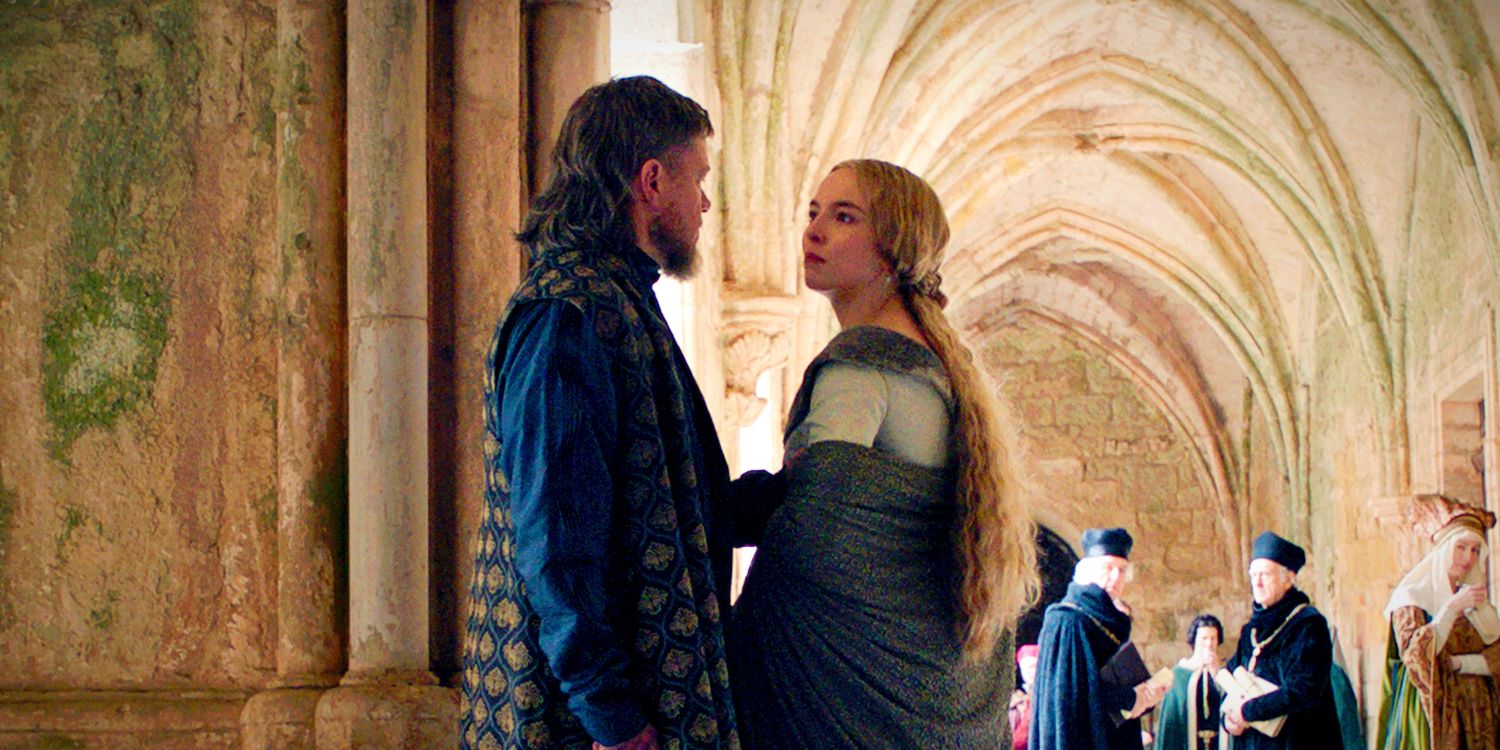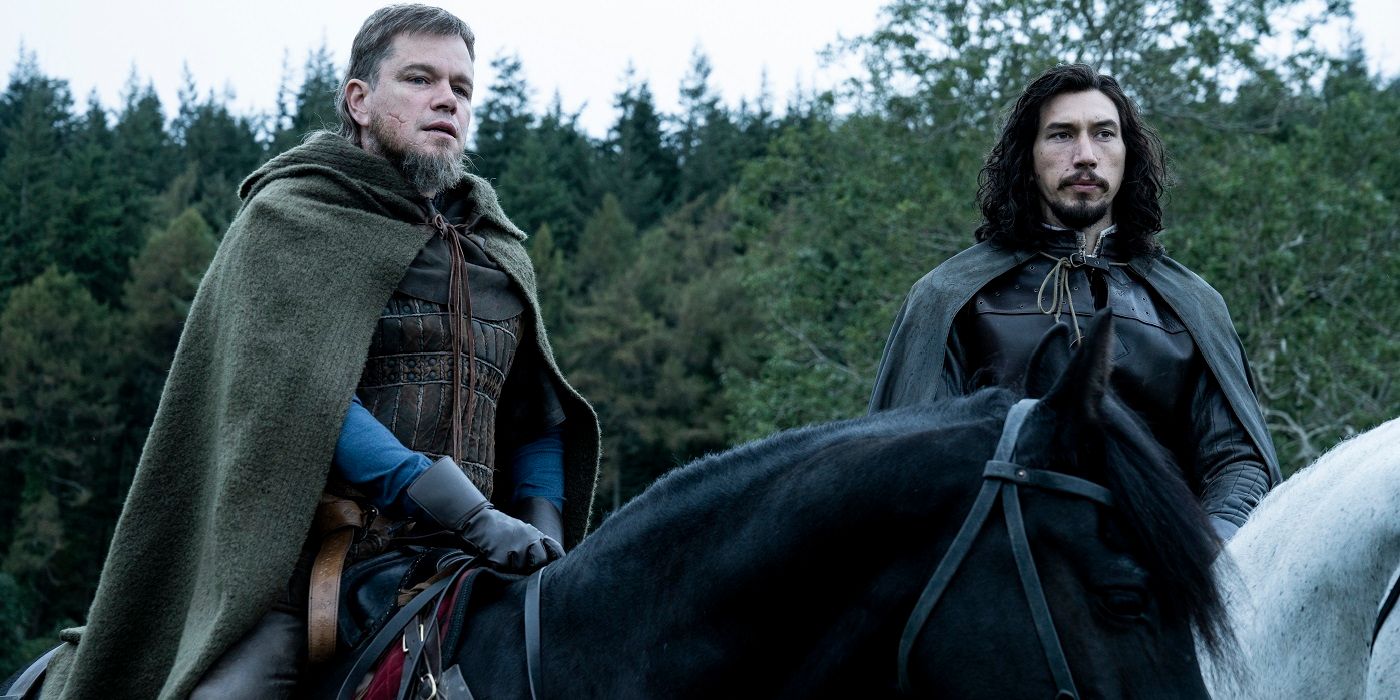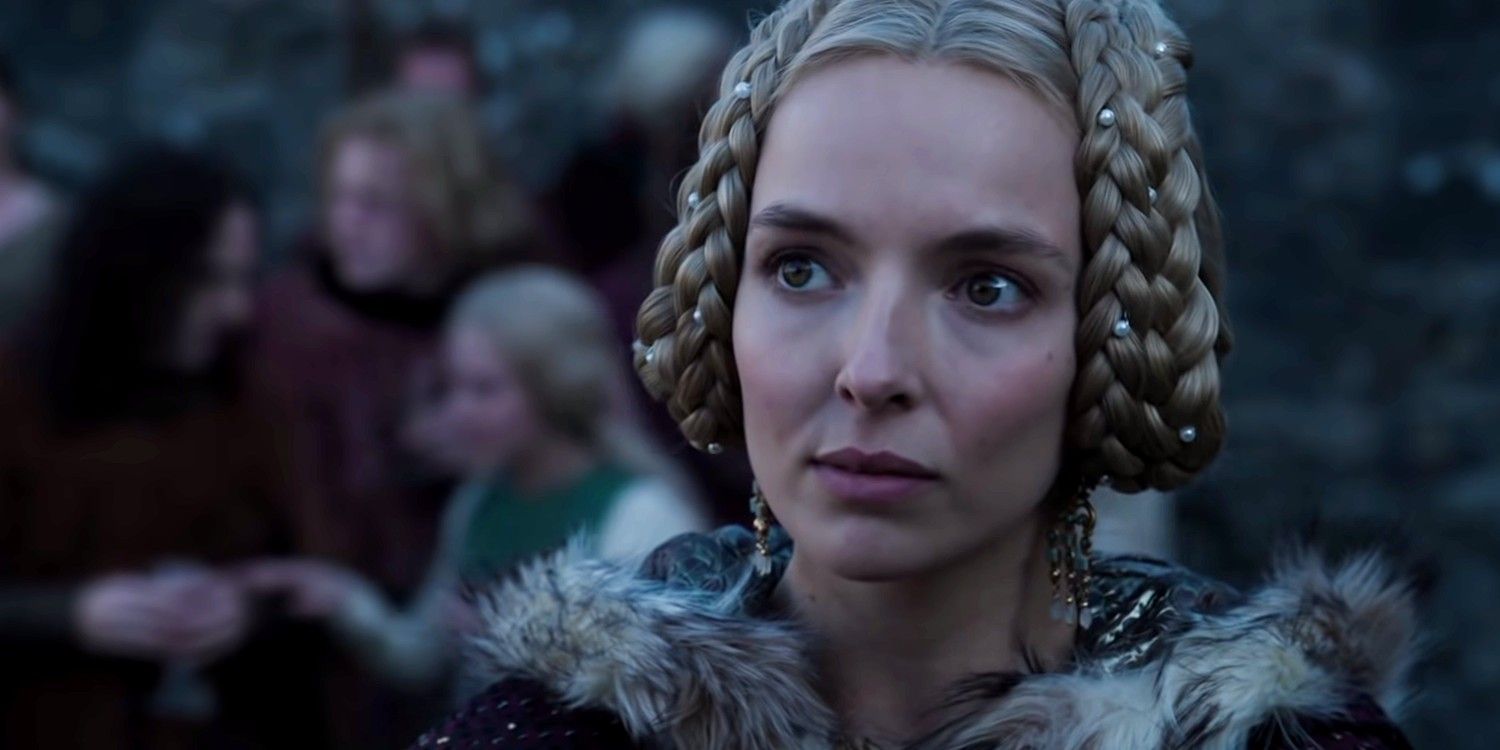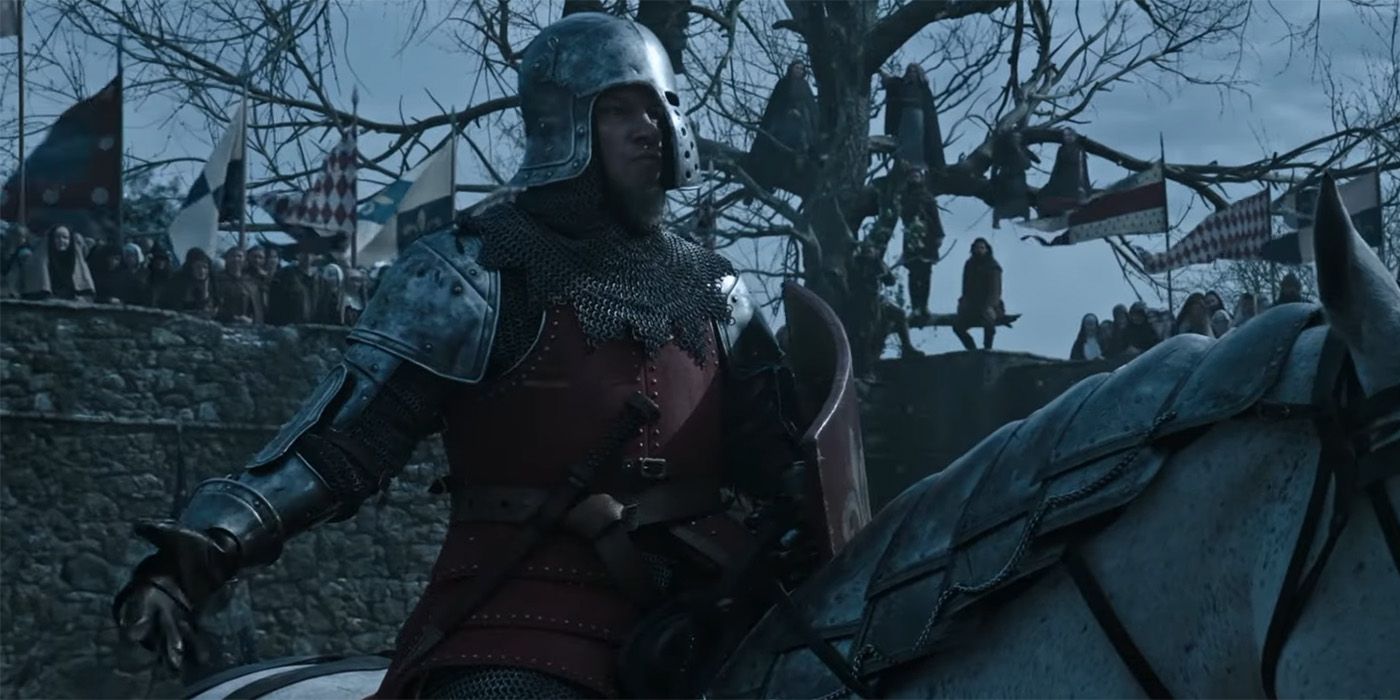Warning: This article contains mention of sexual assault.
Ridley Scott's The Last Duel is based on historical events, but small changes were made in translating the true story to the silver screen. The movie tells the story of France's last officially recognized judicial trial by combat between Jean de Carrouges (Matt Damon) and his former friend turned enemy, Jacques Le Gris (Adam Driver). In the film, Jean's wife, Marguerite (Jodie Comer), accuses Le Gris of rape. When justice fails, it leads Jean to challenge Le Gris to a duel to preserve the honor of his wife and his name while also giving him a reason to fight the man against whom he has long held a grudge.
The events of the film are shown in three separate parts, told from the perspectives of The Last Duel's main cast: Jean, Jacques, and Marguerite. Audiences are shown the growing rift between Jean and Jacques leading up to the rape, Jean’s jealousy for and protectiveness of his wife (or rather, his property), and the general hardship Marguerite found in being a woman in the 14th century. After the accusation and escalation of trial proceedings could not determine a guilty party, it was decided that they would fight a duel to determine each party's innocence or guilt. If Jean lost, it would be taken as God's judgment and considered confirmation that Marguerite had lied and she would have been burned at the stake.
Every Ridley Scott Movie Ranked From Worst To Best
The script was written by Matt Damon, Ben Affleck (who also portrays Count Pierre d’Alencon in the film), and Nicole Holofcener, and is one of many historical movies directed by Ridley Scott. It is based on the 2004 non-fiction book The Last Duel: A True Story of Trial by Combat in Medieval France by Eric Jager, which delves into the historical accounts of the duel. The movie maintains historical accuracy for much of the film, with a few small but notable changes throughout to add dramatic effect.
Carrouges vs. Le Gris Before the Trial
The Last Duel gives a great deal of focus to the relationship between Carrouges and Le Gris leading up to Marguerite’s accusation of rape. Even when the movie switches to Marguerite’s perspective, it is shown that much of the reasoning behind Jean’s willingness to back Marguerite’s accusation comes from a desire for Adam Driver's Jacques Le Gris. The film is correct in portraying the men as friends turned enemies but embellishes and adds to some of the circumstances which turned the men against one another.
The first addition to history comes early in the film, shown from Carrouges' perspective, and sees Carrouges disobeying orders from Count Pierre to stand down from battle before rushing into the fray, calling for his troops to follow. During this battle, he saves Le Gris’ life and is later shown to take great pride in this when he becomes jealous of Le Gris’ success. When the same scene is shown from Le Gris’ perspective, it is shown that Le Gris first saved Carrouges’ life moments before Carrouges returned the favor. However, there is no historical evidence that this exchange of life-saving ever occurred on either side.
Another small historical change made to the backstory that adds to the grudge Carrouges held against Le Gris centers around a military and political rank. Carrouges’ father had captaincy over the small commune in which the Carrouges family lived, Belleme, and Carrouges was expected to inherit this captaincy upon his father’s death. In the movie, Le Gris is instead awarded the captaincy by Count Pierre, who favors Le Gris and takes a disliking to Carrouges when Carrouges sues Pierre over a piece of land. This is very similar to the historical record, except the awarding of the captaincy to Driver’s Le Gris. In real life, Pierre awarded the captaincy to another of his followers.
Another embellishment made to the history of Carrouges and Le Gris in The Last Duel revolves around a meeting between Carrouges and Le Gris during an obligatory report Carrouges brought to Pierre following his return from his campaign in Scotland. Historically, there is a record of the two speaking to one another after Carrouges’ report, but it is unknown what they said to one another. The film adds in dialogue for the characters at this meeting, with Carrouges demanding that Le Gris respect his recent knighthood and insulting Le Gris. The film implies that it is this moment that pushes Le Gris over the edge in his romantic desire for Carrouges’ wife, leading him to enlist a friend to help him see her.
Although the film adds in these moments between Carrouges and Le Gris, the changes are meant to add depth to the relationship between the characters. Each moment between the characters builds resentment, making the fact that they were once friends an even more bitter memory for each one. So while not fully accurate in the historical sense, The Last Duel uses the changes effectively in creating the tension that leads to its title event.
The Story From Marguerite’s Perspective
Another big change made for the film version of The Last Duel is that it provides an account of the story from the perspective of Marguerite. This perspective starts from the point of her marriage to Jean de Carrouges and follows through the events of the trial, duel, and end of the movie. Although the movie presents Marguerite’s (as portrayed by Killing Eve’s Jodie Comer) perspective as the truth, the historical accounts of the events give far more attention to and more heavily rely on the testimonies of Jean and Jacques.
The Last Duel also creates insight into what life was like for Marguerite, portraying her as a dutiful but bored and neglected wife. She is shown to be more capable of running an estate than her husband, taking advantage of the responsibility he allows her when he goes on a campaign to Scotland. The movie also creates drama between Marguerite and her husband by portraying her as being dissatisfied with their sexual encounters and also struggling to become pregnant.
History does not provide the same depth of character given to Marguerite in the movie nor any insight into her life as Carrouges’ wife, whereas the film takes some creative liberty to provide her a story. It gives her a bit more autonomy, portraying Marguerite as a strong woman who will stand against judgment and criticism if it means telling the truth. The film has earned some criticism for sidelining Jodie Comer's character somewhat, but it gives her far more agency than she otherwise might have had.
The Trial Proceedings
Other notable changes made in The Last Duel center around the trial proceedings that follow the accusations of the Carrouges. The addition of Marguerite’s testimony has already been described, but a few other changes were made. The greatest change made is that of the length of the trials. The real-life trial proceedings took place over several months, whereas the film cuts down the trial to brief testimonies from the three main characters.
The Last Duel alluded to evidence given by other characters, such as that of Marguerite’s friend who was revealed to bear witness against Marguerite of her comments on Le Gris’ good looks, which is right in line with the dashing way the Kylo Ren actor is portrayed throughout the film. However, the movie did not show any further testimony given before Parlement. In the historical case, at least one of Marguerite’s maidservants testified, as did Adam Louvel, Le Gris’ accomplice whom Marguerite claimed had also come to her home on the day of the crime.
Regarding their testimonies, The Last Duel left out some of the more deeply unpleasant events from the historical record of the trials. Both Louvel and Marguerite's maidservant, along with a few others, were tortured during their questioning. This was allowed as they were seen as lower class and, at the time, it was believed that torture led to the truth. Also left out was an incident involving one of Le Gris' squires, who was arrested for rape during the trial proceedings, which cast Le Gris in a poor light seeing as how he was responsible for the man and he himself was currently on trial for rape. However, it makes sense that these moments would be stripped from the movie as they don't add anything to the main story.
There is also a bit added to the trial proceedings depicted in the movie adaptation of The Last Duel during the questioning of Marguerite. After listening to the testimony of Carrouges’s now pregnant wife, the Parlement officials inquire about the nature of Marguerite’s sex life. They ask very personal questions about whether or not she enjoyed intercourse with her husband, and whether it might be possible that she was pregnant with Le Gris’ child. In the actual trial, it was decided that Marguerite’s pregnancy had no bearing on the case, given that at the time it was believed that rape could not result in the conception of a child.
Since the film spends much of its two-and-a-half-hour runtime showing the audience the events being questioned in the courtroom, it makes much sense to cut down time spent reviewing these events. Instead of introducing new evidence in the courtroom scenes, The Last Duel focuses on how each of the three main characters conducts themselves in their testimony and questioning. The time spent in court and the added questioning of Marguerite reveals much about their intentions and motives in seeking the extreme measure of trial by combat.
The Details of the Duel and Its Results
The final changes made to the story of The Last Duel are relatively minor but they have to do with the duel itself, so they are also worth noting. Two months following the end of the trial, when King Charles VI ruled that the duel would commence, Carrouges and Le Gris met to take their final stand against one another. All of this is upheld in the film, down to the date of the duel on December 29 of 1386, when Matt Damon's and Adam Driver's characters met in battle.
The minute changes in the film come within the duel itself, which was detailed in Chronicles, the 14th-century prose history of the Hundred Years War written by Jean Froissart. Much of the duel as portrayed in the film is the same as described by Froissart. The biggest exception to this is that in The Last Duel, Carrouges is forced to yield his ax when Le Gris breaks his lance. Froissart’s account states that both yielded axes at the same time, while Le Gris never yielded an ax in the film. Another small change is that while the real-life Carrouges killed Le Gris by stabbing him in the throat, his film counterpart more gruesomely drives his dagger into Le Gris’ mouth. Le Gris' last words, however, were taken directly from the historical record: "In the name of God, and on the peril and damnation of my soul, I am innocent of the crime!"
The rest of the duel as shown in The Last Duel closely follows the historical record, with Le Gris being killed and Marguerite declared innocent of any crime. The only other differences between film and real life are the omission of mention of the monetary reward that Carrouges received. He also again made an attempt to sue Count Pierre for the disputed land, which is unmentioned in the movie after the first attempt of Carrouges to sue Ben Affleck’s character for the land. Instead, the film ends with the peaceful image of Marguerite gazing upon her son as he plays in a garden.
The changes made to the duel itself largely serve to make the event visually exciting and dramatic. The omissions about the events following the duel are relatively unimportant, as the film does provide more relevant historical information regarding Carrouges’ death a few years following the duel. Many of the changes or additions made to the true story depicted in The Last Duel are small enough to go unnoticed by audiences, and serve the dramatic nature of the film.
Fall 2021 Movie Preview: Every Movie Releasing (And Where To Watch Them)




